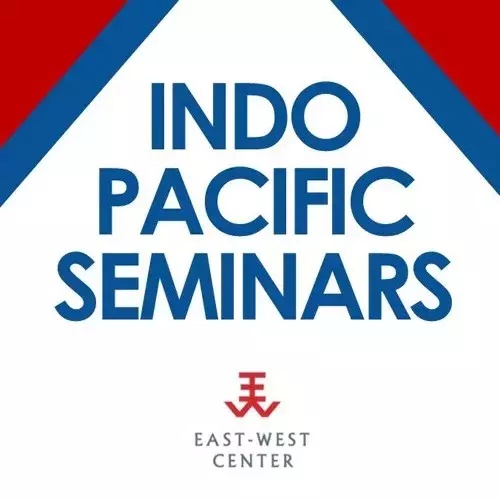Error message

The East-West Center in Washington invites you to the
Indo-Pacific Foreign Policy and Defense Seminar Series:
Japan’s Missile Defense Debates:
A Multipolar World, Collective Defense, and Leadership Transition
Featuring:
Dr. Yoichiro Sato
Professor,
Ritsumeikan Asia Pacific University
James L. Schoff (Discussant)
Senior Fellow, Asia Program
Carnegie Endowment for International Peace
Dr. Satu P. Limaye (Moderator)
Vice President, East-West Center &
Director, East West Center in Washington
>East-West Center in Washington · Japan’s Missile Defense Debates: A Multipolar World, Collective Defense, and Leadership Transition
The cancellation of the planned Japanese deployment of the Aegis Ashore system in June 2020 necessitates a revision of the country’s missile defense plan. This

occurs in the context of a rapidly changing missile threat and defense landscape globally as well as the emergence of a multipolar world. Japan’s initial participation in the missile defense was intended as limited defense against North Korea, but this factor no longer defines the new debate over Japanese missile defense. Leadership transition within the ruling Liberal Democratic Party and the dynamics of its coalition with Komeito (the Clean Government Party) now also bear on this debate. So, too does the U.S.-Japan alliance. This presentation addressed how these factors are shaping Japan’s new directions on missile defense and foreign policy.
Dr. Sato has also written for the East-West Center's Asia Pacific Bulletin series on this subject.
SPEAKER BIOGRAPHIES
Professor Yoichiro Sato holds a BA (Law) from Keio University, MA (International Studies) from University of South Carolina, and PhD (Political Science) from University of Hawaii, and is currently at Ritsumeikan Asia Pacific University. Previously, he has also taught at the U.S. Department of Defense’s Asia-Pacific Center for Security Studies and Auckland University (New Zealand). His more than ten published books include The U.S.-Japan Security Alliance (co-edited with Takashi Inoguchi and G. John Ikenberry, Palgrave, 2011), Regional Institutions, Geopolitics and Economics in the Asia Pacific (co-edited with Steve Rothman and Utpal Vyas, Routledge, 2017), and Re-Rising Japan (co-edited with Hidekazu Sakai, Peter Lang, 2017). His commentaries have appeared in global media including Time, Newsweek, Al Jazeera, Agence Presse Francais, Nikkei Asian Review, Japan Times, Canberra Times, New Zealand Herald, Bangkok Post, Jakarta Post, Khmer Times, etc.
James L. Schoff is a senior fellow in the Carnegie Asia Program. His research focuses on U.S.-Japan relations and regional engagement, Japanese technology innovation, and regional trade and security dynamics. He previously served as senior adviser for East Asia policy at the U.S. Office of the Secretary of Defense, where he focused on U.S. alliance relations in the region and security cooperation initiatives related to North Korea, missile defense, and disaster relief. Schoff has also worked as director of Asia Pacific Studies at the Institute for Foreign Policy Analysis, after living in Japan and other parts of Asia working in the fields of business and education. Schoff’s publications include: “U.S.-Japan Technology Policy Coordination: Balancing Technonationalism with a Globalized World” (Carnegie, 2020), Uncommon Alliance for the Common Good: The United States and Japan after the Cold War (Carnegie, 2017), “What Myanmar Means for the U.S.-Japan Alliance” (Carnegie, 2014), and Tools for Trilateralism: Improving U.S.-Japan-Korea Cooperation to Manage Complex Contingencies (Potomac Books Inc., 2005).
Satu Limaye is Vice President of the East-West Center and the Director of the East-West Center in Washington where he created and now directs the Asia Matters for America initiative and is the founding editor of the Asia Pacific Bulletin. He is also a Senior Advisor at CNA Corp (Center for Naval Analyses) and Senior Fellow on Asia History and Policy at the Foreign Policy Institute at Paul H. Nitze School of International Studies (SAIS). He is magna cum laude and Phi Beta Kappa graduate of Georgetown University and received his doctorate from Oxford University (Magdalen College) where he was a George C. Marshall Scholar. Recent publications include: “America’s ‘Pacific Principle’ in an Indivisible Pacific Islands Region,” (Asia-Pacific Bulletin); “Despite Stumbles, America’s Engagement with Southeast Runs Deep,” (Global Asia); Raging Waters: China, India, Bangladesh, and Brahmaputra Water Politics (Marine Corps University Press); and Russia’s Peripheral Relevance to US-Indo Pacific Relations (Center for the National Interest).
The East-West Center in Washington invites you to the
Indo-Pacific Foreign Policy and Defense Seminar Series:
Japan’s Missile Defense Debates:
A Multipolar World, Collective Defense, and Leadership Transition
Featuring:
Dr. Yoichiro Sato
Professor,
Ritsumeikan Asia Pacific University
James L. Schoff (Discussant)
Senior Fellow, Asia Program
Carnegie Endowment for International Peace
Dr. Satu P. Limaye (Moderator)
Vice President, East-West Center &
Director, East West Center in Washington
>East-West Center in Washington · Japan’s Missile Defense Debates: A Multipolar World, Collective Defense, and Leadership Transition
The cancellation of the planned Japanese deployment of the Aegis Ashore system in June 2020 necessitates a revision of the country’s missile defense plan. This

occurs in the context of a rapidly changing missile threat and defense landscape globally as well as the emergence of a multipolar world. Japan’s initial participation in the missile defense was intended as limited defense against North Korea, but this factor no longer defines the new debate over Japanese missile defense. Leadership transition within the ruling Liberal Democratic Party and the dynamics of its coalition with Komeito (the Clean Government Party) now also bear on this debate. So, too does the U.S.-Japan alliance. This presentation addressed how these factors are shaping Japan’s new directions on missile defense and foreign policy.
Dr. Sato has also written for the East-West Center's Asia Pacific Bulletin series on this subject.
SPEAKER BIOGRAPHIES
Professor Yoichiro Sato holds a BA (Law) from Keio University, MA (International Studies) from University of South Carolina, and PhD (Political Science) from University of Hawaii, and is currently at Ritsumeikan Asia Pacific University. Previously, he has also taught at the U.S. Department of Defense’s Asia-Pacific Center for Security Studies and Auckland University (New Zealand). His more than ten published books include The U.S.-Japan Security Alliance (co-edited with Takashi Inoguchi and G. John Ikenberry, Palgrave, 2011), Regional Institutions, Geopolitics and Economics in the Asia Pacific (co-edited with Steve Rothman and Utpal Vyas, Routledge, 2017), and Re-Rising Japan (co-edited with Hidekazu Sakai, Peter Lang, 2017). His commentaries have appeared in global media including Time, Newsweek, Al Jazeera, Agence Presse Francais, Nikkei Asian Review, Japan Times, Canberra Times, New Zealand Herald, Bangkok Post, Jakarta Post, Khmer Times, etc.
James L. Schoff is a senior fellow in the Carnegie Asia Program. His research focuses on U.S.-Japan relations and regional engagement, Japanese technology innovation, and regional trade and security dynamics. He previously served as senior adviser for East Asia policy at the U.S. Office of the Secretary of Defense, where he focused on U.S. alliance relations in the region and security cooperation initiatives related to North Korea, missile defense, and disaster relief. Schoff has also worked as director of Asia Pacific Studies at the Institute for Foreign Policy Analysis, after living in Japan and other parts of Asia working in the fields of business and education. Schoff’s publications include: “U.S.-Japan Technology Policy Coordination: Balancing Technonationalism with a Globalized World” (Carnegie, 2020), Uncommon Alliance for the Common Good: The United States and Japan after the Cold War (Carnegie, 2017), “What Myanmar Means for the U.S.-Japan Alliance” (Carnegie, 2014), and Tools for Trilateralism: Improving U.S.-Japan-Korea Cooperation to Manage Complex Contingencies (Potomac Books Inc., 2005).
Satu Limaye is Vice President of the East-West Center and the Director of the East-West Center in Washington where he created and now directs the Asia Matters for America initiative and is the founding editor of the Asia Pacific Bulletin. He is also a Senior Advisor at CNA Corp (Center for Naval Analyses) and Senior Fellow on Asia History and Policy at the Foreign Policy Institute at Paul H. Nitze School of International Studies (SAIS). He is magna cum laude and Phi Beta Kappa graduate of Georgetown University and received his doctorate from Oxford University (Magdalen College) where he was a George C. Marshall Scholar. Recent publications include: “America’s ‘Pacific Principle’ in an Indivisible Pacific Islands Region,” (Asia-Pacific Bulletin); “Despite Stumbles, America’s Engagement with Southeast Runs Deep,” (Global Asia); Raging Waters: China, India, Bangladesh, and Brahmaputra Water Politics (Marine Corps University Press); and Russia’s Peripheral Relevance to US-Indo Pacific Relations (Center for the National Interest).








